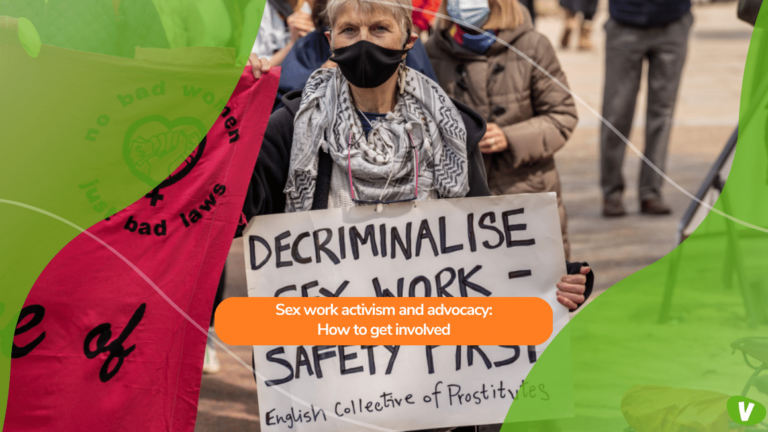Sex work is a job. Yet sex workers have fewer rights than workers in other industries, leaving sex workers vulnerable and facing harmful stigma.
The way sex workers worldwide are treated is seen by some as unfair and unjust. Sex workers need support and allies, and not just from within their community. It’s important for everyone to stand up for their rights, as this will lead to better working conditions and a more positive public perception of the job.
- What is sex work activism and why is it important?
- Common challenges and barriers faced by sex workers in activism
- How can sex workers get involved in activism at a local level
- How can allies support sex worker advocacy
- Key policy changes and legal reforms sex worker activists are advocating for
- Advice for getting started in sex worker activism
- The takeaway
But how do you get started? In a world set up against sex workers, finding ways to provide allyship and activism is tough. However, we’ve got a complete guide to help you get started.
Scroll down to learn how you can get involved.
What is sex work activism and why is it important?
Sex worker activism is defined by the actions and efforts made by organisations, communities, and individuals to fight for sex workers’ rights and safety. Activism usually involves challenging discrimination and social stigmas or creating an educational conversation around the subject.
Activism for sex work is important as sex workers are sometimes marginalised and, like other marginalised communities, can face forms of exploitation, abuse, and violence. There are legal and social barriers that limit their rights and sex workers may also face limited access to healthcare and other social or financial services due to the aforementioned discrimination and stigma.
Overall, these factors can create significant barriers to healthcare and other services for sex workers, which can have serious consequences for their health and well-being. To address these issues, it is important to advocate for the rights and safety of sex workers, challenge stigma and discrimination, and work towards the decriminalisation of sex work.
Standing together and disrupting the general narrative aims to address these issues while empowering sex workers. The aim is to give sex workers control over their working rights and lives while decreasing the possibility of abuse, issues, and any other negative issues.
Common challenges and barriers faced by sex workers in activism
When advocating for rights and equality, sex workers face various barriers and challenges. These typically include:
- The inability to get their voices heard on a public platform due to censorship
- Negative social stereotypes that the public can’t see past
- Lack of legal framework supporting their job/livelihoods, which can’t be changed overnight
- Voices getting blocked on certain social media platforms for talking about sex work
- Starting a conversation with the public is difficult due to the lack of information about sex work

How can sex workers get involved in activism at a local level
Sex worker activism is a global issue, but most work starts at home. If you’re a sex worker, getting started in your local community is a good way to slowly change the narrative surrounding the issue.
Find local communities of sex workers and listen to their experiences. Talking together will help you realise what local/community-level issues need to be addressed first. Many can find sex worker groups online via forums or social media platforms.
Work with local charities to create awareness days and campaigns. There might be specific events closer to home than you think, and the best way to find out and raise awareness is via nearby charities.
Sex workers can also work with small businesses to raise awareness. This could include putting sex-positive leaflets or signs in store windows or holding informative events in local coffee shops.
Key organisations and networks that support sex worker activism and advocacy
Working with organisations and charities is one of the best ways to get informed. It can also help you join a cause that has a solid direction, which is helpful, as solo activism can seem tough sometimes.
Top UK organisations and networks include:
- English Collective of Prostitutes
- Sex Worker Advocacy and Resistance Movement (SWARM)
- Decrim Now
- United Sex Workers
- Decriminalize Sex Work (USA)
How can allies support sex worker advocacy
Getting involved in sex work activism isn’t only for industry professionals. Anyone can join the fight for sex worker rights, regardless of their career path.
The best ways allies can support sex workers include:
- Don’t try to rescue sex workers. Not all sex workers want out of the industry. The fight is for rights and not a rescue.
- Do your own research. Mainstream media outlets are often against sex workers, so doing thorough research is the best way to educate yourself.
- Understand that sex work is real work. This is at the heart of the movement.
- Find and share resources. Explore pro-sex work organisations and their educational resources with your circle.
- If sex work comes up in conversation, stand up for sex workers. Don’t let stigma and shame be the leading narrative.
Allies are important to sex workers, and the more the public understands that sex work is real work, the more change we’ll see.
Key policy changes and legal reforms sex worker activists are advocating for
Laws and legal reforms are at the heart of a lot of sex work activism. But do you know what sex workers are working towards?
One of the most important reforms sex workers are advocating for is decriminalisation, which will work to reduce the stigma of sex workers and stop the job from being a criminal offence. This will also open the door for sex workers to receive healthcare, legal protections, and other social services.
Moreover, general labour protections are another important point, as these would allow sex workers to unionise and receive better working protection. All other jobs receive this protection, so sex workers believe they should too. Sex workers are also fighting for equal healthcare access without stigma. For example, access to fair treatment and HIV/AIDS treatment and prevention.
Anti-discrimination laws are another key aspect of sex worker activism. These laws protect sex workers from discrimination when applying for housing, jobs, and in other formal settings.
The best says sex workers can get educated about their rights and sex worker laws
Key barriers facing sex workers are the laws and legal rights. Making a legal change might sound overwhelming, but with many advocates, sex workers and allies can make a change.
There’s a lot of information online, so it can be tough to pick out which sources are relevant to you. The best route to take is via local information sources. Check who is publishing information, as you don’t want to end up mistaking another country’s laws for your own.
The best place to get law-based information is via a sex work charity from your region. Non-profit networks usually offer the latest news and policy changes for their region via online blogs or articles.

Advice for getting started in sex worker activism
The best journeys start with education, so get reading before joining protests or signing petitions. Find country-specific information and explore what your local sex workers are fighting for.
Once you know your goals, find local groups and join any protest events. You can also share the word on social media to raise general awareness. Petitions are a great way to get others involved, but make sure the petitions you’re sharing are actionable and not an empty online page – this happens more than you’d expect.
When in doubt, check in with local sex workers and see where they’re focusing and how you can help.
How to mobilise and build community with other sex workers
Allies are an important part of activism, but sex workers should also build a community together. This allows you to chat with like-minded individuals who understand the first-hand challenges of the profession.
If you’re looking to build a sex worker community, try the following:
- Connecting with existing networks on a local and nationwide scale
- Build personal relationships with sex workers
- Elevate the voices of sex workers by listening to their stories
- Focus on shared activism goals together
- Create an open and supportive environment
- Reach out to others via social media or online forums
Together, you can outline your key activism objectives and start working towards these goals together.
Using social media to raise awareness and connect with allies
Social media is one of the greatest tools available, and we all have it at our fingertips.
Use social platforms to your advantage by spreading the word and connecting with sex-positive advocacy groups online. Sex worker activists can be found across all social media platforms, and the best way to get involved is by educating yourself with their content and sharing it on your page or with your network.
Alongside sharing stories and messages, social media connects allies together. Join groups and message boards to discuss your sex worker activism with like-minded users. This way, you can learn about real-time issues and develop your own understanding of the issues. Join local and national groups to ensure you are involved in the fight on all levels.
The takeaway
Whether you’re a sex worker or an ally, joining the cause is important and a great way to help the community. Hopefully, this blog has introduced you to sex worker activism and given you a sense of direction for your own activism. When in doubt, education is always the way to go — and official charities and sex workers are the best resources for your learning.





